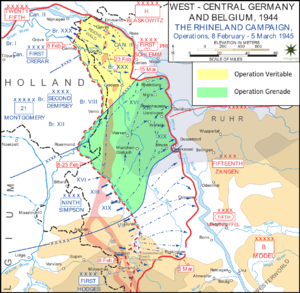Operation Veritable
| Operation Veritable (Battle of the Reichswald)/Operation Blockbuster | |||||||
|---|---|---|---|---|---|---|---|
| Part of Western Front, World War II | |||||||
 Operations Veritable and Blockbuster (yellow) and Grenade (green) |
|||||||
|
|||||||
| Belligerents | |||||||
|
|
|
||||||
| Commanders and leaders | |||||||
|
|
|
||||||
| Strength | |||||||
| 200,000 | 90,000 | ||||||
| Casualties and losses | |||||||
| 15,634 casualties | ~44,239 casualties | ||||||
Operation Veritable (also known as the Battle of the Reichswald) was the northern part of an Allied pincer movement that took place between 8 February and 11 March 1945 during the final stages of the Second World War. The operation was conducted by Field Marshal Bernard Montgomery's Anglo-Canadian 21st Army Group, primarily consisting of the First Canadian Army under Lieutenant-General Harry Crerar and the British XXX Corps under Lieutenant-General Brian Horrocks. The U.S. Ninth Army was incorporated into the 21st Army Group. The objective of the operation was to clear German forces from the area between the Rhine and Maas rivers, east of the German/Dutch frontier, in the Rhineland. It was part of General Dwight D. Eisenhower's "broad front" strategy to occupy the entire west bank of the Rhine before its crossing. Veritable (originally called Valediction) had been planned for execution in early January, 1945 when the ground had been frozen and thus more advantageous to the Allies. The Allied expectation was that the northern end of the Siegfried Line was less well defended than elsewhere and an outflanking movement around the line was possible and would allow an early assault against the industrial Ruhr region.
The operation had complications. First, the heavily forested terrain, squeezed between the Rhine and Maas rivers, reduced Anglo-Canadian advantages in manpower and armour; the situation was exacerbated by soft ground which had thawed after the winter and also by the deliberate flooding of the adjacent Rhine flood plain. Second, Veritable was the northern arm of a pincer movement. The southern pincer arm, Operation Grenade, by Lieutenant General William Hood Simpson's U.S. Ninth Army, had had to be postponed for two weeks when the Germans released the waters from the Roer dams and river levels rose. No military actions could proceed across the Roer until the water subsided.
...
Wikipedia
